The Queen presents the 1966 World Cup trophy to England captain Bobby Moore © Wikipedia
OPINION
In the evening of the Day England won the World Cup in 1966, I went with my sister, her husband, my cousin and his wife-to-be to a pub in Rickmansworth to celebrate. Rickmansworth is a small town in Hertfordshire, about 27 kilometres northwest of Central London. As a town it had no connection with the football match, other than being home to a pub within easy reach of my grandparents’ house in South Oxhey, where we had all watched the match. Indeed, just about everyone, it seemed, had watched the match; I’ve never seen the streets so deathly quiet. But that evening, people were in politely celebratory mood in that pub, with only good things to say about skipper Bobbie Moore and the Charlton brothers, who at least hailed from that part of England I called home, the North East. I say politely, because any cheering was muted and far from the nationalistic nonsense that is often chanted today.
If Franz Beckenbauer, Horst-Dieter Höttges or Willi Schulz had walked up to the bar, most of the patrons would have slapped them on the back and offered to buy them a pint. Except, perhaps, for a large group of women occupying one corner of the barn-like room. They came in two varieties, too: some in very pretty, floral outfits fringed with frills and furbelows, while the rest had short hair, rather masculine trousers and no make-up. In fact, it soon became clear that we had walked in on a get-together of a local Lesbian group, who may or may not have been celebrating England’s one-and-only World Cup win. I was just 18 at the time, so this was the first time I had been made aware of the somewhat un-binary nature of sexual relations. It was not something we had ever talked about at my school. I learned more later when my elderly uncle took me to meet his long-term boyfriend with whom he had lived happily for years. The friend was quite noticeably ‘camp’, but my uncle liked him, so that was OK, although I turned down his offer to join him for some nude sunbathing in the garden. It was raining anyway.
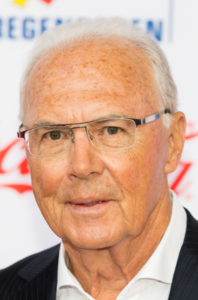
Life was never just one thing or another, black or white; there has always been a degree of uncertainty at the crossover point, many different shades of grey. Later, when carrying out a job in Wales, I was warned that I “might be embarrassed” if I went for a drink in a particular pub near to my Cardiff hotel. It was known locally as a place where men met other, like-minded men. But, as the French eloquently put it, “à chacun son gout”. We all have our different tastes; we’re born with them and cannot help what we are. I’m grateful to have been born “normal” as some people put it, although there’s nothing “abnormal” about being gay. I have had this argument with an Austrian friend who believes (on the basis of no evidence whatever) that homosexuality is “a lifestyle choice”, like joining the Conservative Party, taking up billiards or becoming a Freemason (none of which I have done). I tried to point out that some people were born that way and couldn’t help it, nor did they want to help it. It was part of what they were. My friend, though, was religious and couldn’t bring himself to believe that his God would have “made a mistake”. Looking around the world and reading the news websites, I find one is drawn to the unavoidable conclusion that God (if he exists) makes mistakes all the time. One is left to wonder if he sometimes sniggers at them, too. Now, I don’t want to upset my religious friends, whatever religion they choose to follow. I’m proud to have friends who are Muslim, Catholic, Protestant, Jewish and one I particularly like who, along with his family, is a Jehovah’s Witness. A nicer family would be hard to find. But I don’t share his faith, even though he very kindly gave me a copy of the Jehovah’s Witness bible. I’ve seen enough war zones and sickness and dead bodies to convince me that “man’s inhumanity to man” has very little to do with an all-powerful spirit of some kind and more to do with us humans having a strong propensity for hatred of our fellow-humans and a love of spilling blood.

It was the great Scottish poet Robert (Robbie) Burns who wrote in 1784 his “dirge”, A Man Was Made to Mourn, which contains the lines:
“And man, whose heav’n-erected face
The smiles of love adorn,
Man’s inhumanity to man
Makes countless thousands mourn!”
The “inhumanity” line had been used before, if not so neatly worded, by Samuel von Pufendorf in 1673, (he actually wrote: “More inhumanity (to man) has been done by man himself than any other of nature’s causes,” which doesn’t quite have the ring of Burns) and in many references since.
CHANGING NATURE’S PLAN (IF IT HAS ONE)
By and large, from what I have seen, people who are gay don’t try to recruit us “straights” to their cause (despite my uncle’s pal wanting me to sunbathe nude with him; I am convinced there would have been no ‘hanky-panky’, as people quaintly put it in those days, if I had). You are what you are, and yet Poland has tried to prevent people from being what they are. Or perhaps it wants them simply to deny what they are. Over a hundred local authorities have declared themselves “LGBTIQ-free zones”, which means local authority administrations are knowingly and deliberately intolerant towards people who express themselves as ‘Lesbian, gay, by-sexual, trans-gender or trans-sexual, intersex or queer or questioning’, and where gay “ideology” is banned. I have travelled widely and reported from many different parts of the world but I have yet to understand what on earth is meant by LGBTIQ “ideology”. Someone is either gay or they’re not; it’s not a political party, it’s not left wing or right-wing, it’s not a set of beliefs or some kind of participatory sport and it doesn’t demand elaborate ceremonies or the wearing of strange regalia, like in the Masons. It’s what your body is. Those who indulge in such restrictions should, perhaps, ask themselves if they personally could be swayed by pro-gay ‘ideology’ (I have yet to see any, if it exists, other than ill-written and rather rude graffiti in men’s toilets). I’m sure they couldn’t, and no more could gay people be swayed by anti-gay propaganda.
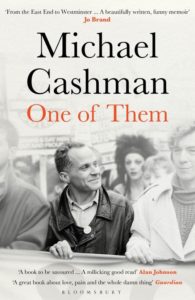
Michael Cashman, now Lord Cashman of Limehouse, tells his life story in One Of Them: From Albert Square To Parliament Square … from East End boy and child actor to soap star, Stonewall founder, MEP and now member of the House of Lords”
Michael, now Lord, Cashman, a Labour member of Britain’s House of Lords and a former Socialist member of the European Parliament, has spent much of his life campaigning for gay rights and was married to a very charming man, Paul, in a ceremony attended by the then prime minister, Tony Blair. At a press conference in Strasbourg, Cashman once surprised and embarrassed the then President of the Parliament, German Socialist Martin Schulz, by kissing him on the lips in front of everyone. It was a very brief act of pure mischief and Schulz looked somewhat shocked , but he laughed about it, as he was meant to.
It was hard to stay angry with Cashman. He had been an actor before entering politics and took part in the first gay kiss between two men in a prime-time episode of the popular television soap opera, EastEnders. As a child, he was approached to audition for the American version of the musical Oliver after being spotted by a talent scout in a school production. He describes it in his appropriately-titled and fascinating autobiography, ‘One of Them’ (I’ll leave you to guess what the ‘them’ referred to), including his father’s opposition. “It’s full of queers yer’ know,” said Cashman’s father, and it didn’t put him off. “My ears pricked up but I pretended I wasn’t listening and continued watching the telly. “ ‘Queers,’ repeated my Dad. Queers. It seemed a funny word. But it wasn’t so much the word, it was the way everyone reacted to it.” In a conversation in Strasbourg, Cashman once told me that the idea that he’d be “surrounded by queers” was one of the features of the acting profession that he found most attractive. As a boy, he had ‘scrounged’ the money for a seat in the gallery to see the London performance of Oliver and was captivated immediately by the magic of the theatre. The whole experience entranced him and set the course of his life.
I know that gay people will not agree with me, but I actually feel very sorry for anyone born to prefer sex with people of their own gender. Those I have known have often ended up lonely and rather sad, however flamboyant in everyday life. Even my uncle saw out his days in an old folk’s home on the south coast after his life-long (and more successful) partner – also an actor – died, mainly surrounded by elderly ladies who found his good looks and wonderful deep brown speaking voice irresistible, but who were unable to interest him physically.
I did not inherit his looks, sadly, but neither did I inherit his sexuality. The brilliant but difficult comic actor Kenneth Williams admitted to loneliness, resulting from him being gay, from being ‘different’.
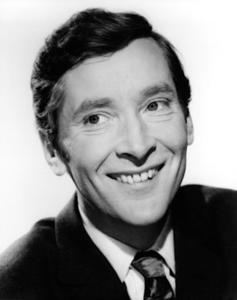
“I wonder if anyone will ever know the emptiness of my life,” he wrote in his diary. The fact of writing in it at all disturbed him. “Fundamentally, diaries are about loneliness,” was one of his comments. His final entry reads “Oh, what’s the point”. And that feeling came despite his huge popularity and the frequent repeats on television of the so-called “Carry On” comedies in which he had starred so often, with their use of rather obvious and slightly rude innuendo. In fact, despite his unhappiness, he could rarely resist a joke about his situation “I can’t stand innuendo,” he once wrote. “If I see one in a script, I whip it out immediately.” I must say that as far as I’m concerned, what other people do in the privacy of their own bedrooms is of no interest to me at all. I would draw the line at cruelty or violence, but not at what two like-minded people want to do to or with each other. It’s none of my business, nor anybody else’s. Life’s too short to agonise about the finer points.
ALL CHANGE FOR TOLERANCE
Williams might have appreciated the decision taken in March by the European Parliament to declare the EU an “LGBTIQ Freedom Zone”. The overwhelming vote was in direct response to the anti-gay actions of Poland, and, to a lesser extent, Hungary. The Polish regulations insist that local governments should “refrain from encouraging tolerance towards LGBTIQ people and withdraw financial assistance from organisation promoting non-discrimination and equality.” Which means that a supposedly Christian country is encouraging the sort of response against the way people are that the Romans exercised against those who adopted Christianity as their chosen faith. Or, perhaps, people in the 16th and 17th centuries did towards those who, despite being fellow Christians, used a different prayer book and therefore had to end their lives on a bonfire. I’m sure they don’t see it that way, of course; they think they’re saving people’s souls, rather than driving them towards suicide and despair. The European Parliament motion, passed by 492 votes in favour to 141 against, with 46 abstentions, points out how the declared LGBTIQ-free zones lead to increased hate speech from public authorities, the president and the pro-government media. Why? Homosexuality is not catching, like measles, so what are the Polish authorities afraid of?
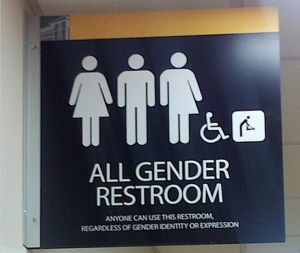
I know that things can be different if someone decides they want a change of sexual identity later in life. When I was working in radio, the station had a late-night disc jockey with a deep, cultured voice and a faint Irish accent. I won’t give his real name; let’s call him Mike (which wasn’t his name, of course). He was a large man, broad of shoulder and deep of voice and he broadcast his immensely popular live show from a remote studio, a good half an hour’s drive from the station’s headquarters, where I worked as a journalist. One of my colleagues returned one day to base with a claim that ‘Mike’ was changing; he sounded the same and was as professional as ever. But he had started wearing make-up. A little later, someone reported that he’d presented his show in a wig. Not long after that, he was spotted wearing women’s clothes. His audience loved him but were unaware of what was happening. Then it came out that he was in a queue to have a sex change operation. He had two teenage sons, who joined their mother in begging him to change his mind, not his gender, but he wouldn’t, even when his American surgeon warned him that “you’ll make one Hell of an ugly broad, Mike” (he did, too). Mike went through with his plan. He even explained to me in gory detail what the operation involved. I think I sat with my legs crossed for the next few weeks.
Anyway, his convalescence over, he returned to work. The boss called him in and reassured him that he could continue with his regular programme. But he would have his pay cut. Why, you may ask (Mike certainly did). “Because we pay our female presenters less than we pay the men,” the boss said. It was shocking back then in the 1980s and it sounds downright disgraceful to a modern ear. I think Mike was most upset by the fact that his sons wanted nothing more to do with him. That’s the thing with gender changes or even with just a change of sexuality: the person at the centre of it seems to forget the colossal shock and hurt their decision forces upon those around them, especially their life partner and any children. They presumably find it impossible to continue to live what they see as a lie, but it forces everyone who knows them to face a truth they could never have anticipated. I don’t know where the morality is in such a case but Polish intolerance doesn’t appear to me to be an answer. Intolerance seldom is.

VARIETY IS THE SPICE OF LIFE
Another issue thrown up by gender uncertainty comes in the field of sport. Take the case of the female Indian track star Dutee Chand. She was India’s leading female sprinter, recording a fastest-ever time in a 60-metre race. But just as she was getting noticed, the Athletics Federation of India, backed by the sport’s parent body, barred her from competing in world events because of her unusually high level of natural testosterone. No-one ever accused her of taking a banned substance; it was just one of those strange things that nature sometimes comes up with to surprise us all. Chand’s case was reported in the magazine Scientific American. The high testosterone gave Chand an advantage when running that is normally only enjoyed by men. Not surprisingly, she disputed the claim that she was more like a male sprinter than a female one: all the other physical features made plain her female sexuality and in 2015 the Court of Arbitration for Sport agreed with her. So Chand resumed her sporting career. It did lead to a change in the rules, however. World Athletics now bars women with abnormally high levels of testosterone from races of between 400 metres and a mile unless they either take medication to lower their testosterone or else choose to compete against men. The rule does not affect Chand, I’m pleased to report, because she’s a sprinter and never races over such distances. Scientific American’s official editorial policy is that high testosterone should not bar women from competitive sports. They didn’t seek out that condition, nor do anything to attain it.
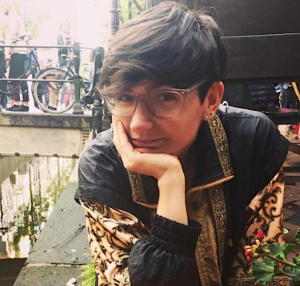
The writer of Scientific American’s fascinating article, Grace Huckins, is a doctoral student of neuroscience at Stanford University as well as being a graduate of the masters’ programmes in neuroscience and women’s studies at the University of Oxford. “As an interdisciplinary scholar trained in both biology and gender studies,” she wrote, “I have examined the ways in which scientists take social categories such as ‘woman’ and ‘man’ and attempt to turn them into fundamental truths. For as long as scientists have been trying to figure out the biological basis of sex and gender, nature has presented divergences from their theories.” In case you need further clarification, she stresses that ‘sex’ refers to biological characteristics; ‘gender’ refers to social rôles and identification. It’s nothing like as easily understood and clear-cut as the Polish government (and the country’s bishops, it seems) would like us to believe.
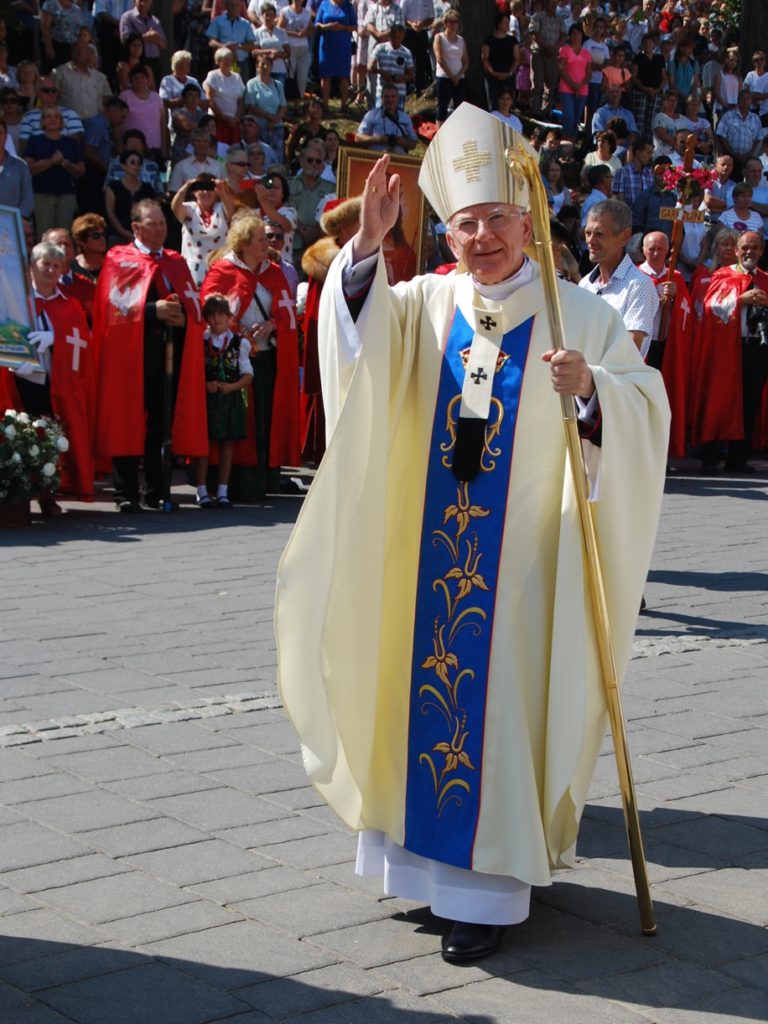
As Huckins points out, “sex has never been a simple binary”. That’s a scientific fact, whatever the people who want to suppress homosexuality may choose to believe. It has caused problems in sport for years. Huckins stresses that dozens of women were singled out or even disqualified by the Olympic regulators from the 1960s to the 1990s because of their chromosomes. Huckins cites the case of Ewa Kłobukowska, who was declared to be a woman after a genital examination in 1966 but was disqualified two years later because of the make-up of her XY chromosomes. For most women so affected, the truth never comes out and they lead perfectly normal lives. As girls, they probably still played with dolls, rather than toy soldiers. It’s only in sport where officials look for possible rule breaches, however unintentional. Is it fair? Arguably not: the unusual height of Sudanese-born basketball star Manute Bol at 2.31 metres gave him clear advantage and helped his teams, the Washington Bullets and others, to success, mainly by blocking shots, rather than scoring. Nobody suggested he should be barred; he came from a family of exceptionally tall people: his mother had been 2.08 metres tall, his father 2.03, the same height as his sister. They were all members of the Dinka people, who all tend to be very tall for genetic reasons.
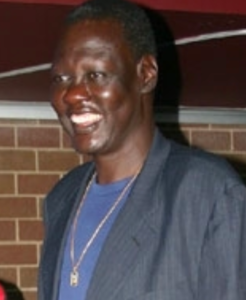
He died of acute kidney failure in 2010 at the age of just 47 after contracting Stevens-Johnson syndrome, an especially unpleasant complaint, during a visit home. There are downsides to being exceptional and dying younger than one should is often one of them. Incidentally, Bol had also been an energetic campaigner for human rights in the Sudan and had donated almost all of his earnings as a player to Sudanese charities. He was a much liked and greatly-admired human being.
As Huckins points out, androgens, which are male hormones such as testosterone but include others, too – and their female equivalents, estrogens, are much more closely linked than many of us might think. She also stresses that every naturally occurring estrogen in the human body started out as testosterone but was converted into estrogen by an enzyme called aromatase. As to what exactly constitutes a chromosome, they are thread-like structures to be found inside the nucleus of animal and plant cells. Each one is made of protein plus a single molecule of deoxyribonucleic acid (DNA). Passed from parents to offspring, DNA contains the specific instructions that make each type of living creature unique. Scientists often disagree on how much of any hormone is ‘natural’. The actual figures change and sometimes overlap during a human lifetime, while levels of testosterone are linked with age for men (younger men have more) and with the degree of fitness in women (women who work out regularly may well have higher levels of testosterone).
The point here is that it’s not all cut and dried with conclusions being drawn from how much of various hormones people individually possess. All humans have 23 pairs of chromosomes: 22 that are numbered, called autosomes, plus one pair of the sex chromosomes, X and Y. A child contains one set of chromosomes from each parent: if they get two X chromosomes, they are born female, but if it’s one X and one Y, the baby will be male. Very occasionally – in about one case in a thousand – a child is born with one extra Y chromosome, being born with an XYY arrangement, known as Jacob’s syndrome. In most cases, this makes little or no difference. Some may be taller than average, or have learning difficulties or speech impediments, or even have a physical problem, such as a muscle weakness. By and large, we are divided fairly clearly into male and female, although not always as obviously, nor as certainly as some Polish law-makers may like.
WALK LIKE A MAN
It’s certainly unwise to say you are a member of the LGBTIQ community when you are travelling abroad. In Brunei, for instance, a law was passed last year making it legal to flog or stone to death anyone who identifies as LGBTIQ. Prohibiting gay couples from adopting children and not respecting their right to cohabit seems small beer by comparison. Being gay is currently illegal in 71 countries, including Saudi Arabia, Afghanistan and Iran (the last two are pretty dangerous for anyone, gay or straight).
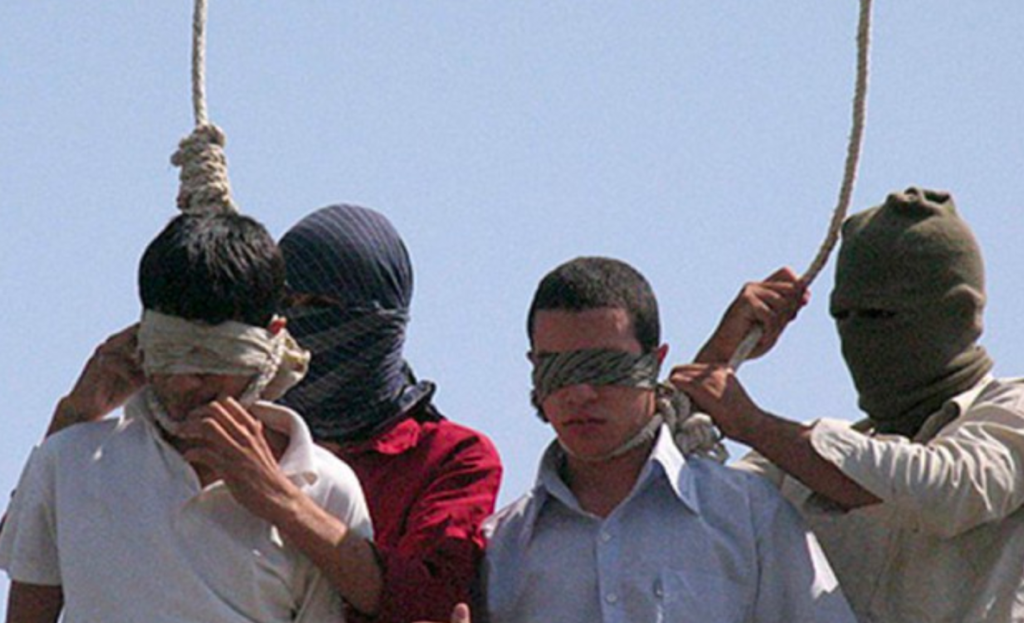
In Nigeria, a gay person can be beaten half to death in the street and still face fourteen years in prison. In some Islamic states, Sharia law still demands the death sentence. You have to ask yourself: why? As I mentioned earlier, homosexuality is not catching, nor does it pose a threat to anyone except the gay person, who may face violence, discrimination and hate speech, as well as a lonely old age. It’s as if those imposing the vicious sentences are afraid of difference. Variety, they say, is the spice of life; in homophobic countries it may also be the road to death.
Lyric Fergusson, a journalist and blogger, has pointed out that of the 70 countries in which a same-sex relationship is illegal, 47 were once members of the British Empire. What a proud record for today’s British neo-nationalists to boast about! Fergusson points out that it was only in 2018 that India finally annulled a colonial-era law against same-sex relations – what India’s red-coated “masters” had called ‘unnatural acts’.
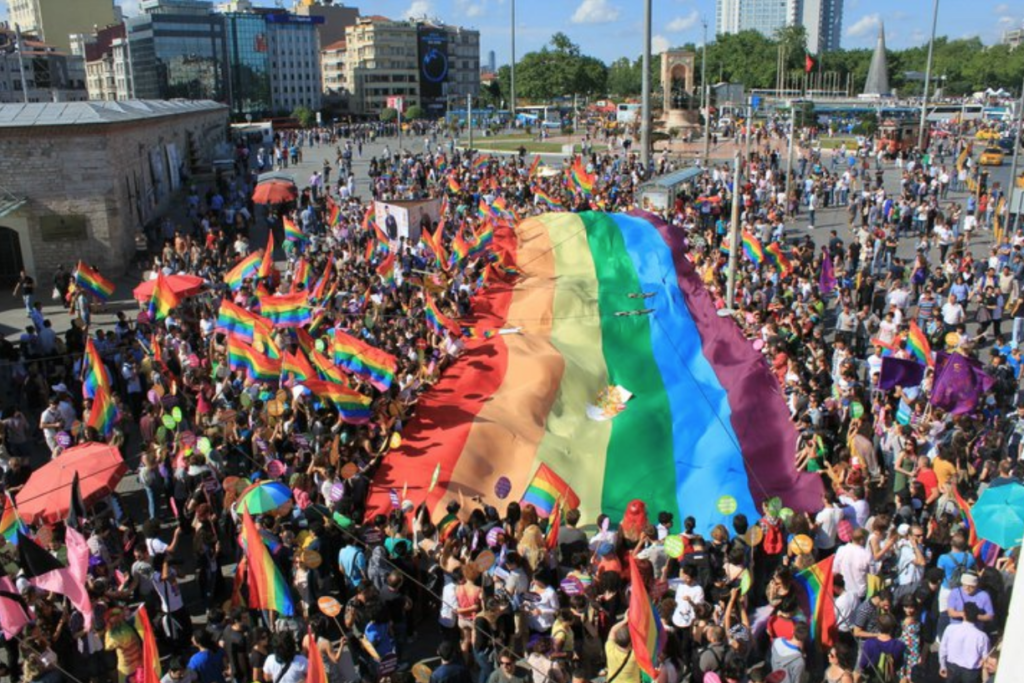
And in case anyone should imagine that this was just the imperialist Brits enforcing old laws from the past, Fergusson is keen to stress that Indian literature, such as the Mahabharata and Ramayana have many references to heroes who would have identified as LGBTIQ in today’s world, “including transgender warriors and two queens who made love in order for one queen to get pregnant with an heir for their kingdom,” (I’m not quite sure how they thought that would work). “To cut a long story short, this points to the fact that it was likely the British influence that largely led to Indian homophobia in the first place,” she says. It’s true that when I was at primary school in the industrial north of England, all coal mines, factories and cranes, our school atlases still showed much of the world in pink, representing the British Empire. My mother thought it was wonderful and played ‘Land of Hope and Glory’ on the piano for us to sing along with. It never occurred to us – and we were never taught – that to “set the people free”, as the song urged us to do, the best thing we could all have done would have been to pack up and go home.
But problems can occur in Europe, too. In Belgium, I interviewed a couple of gay men who lived together in Antwerp and had done so for several years. They didn’t disturb or hurt anyone else. Then an Islamic family moved in next door and their quiet domestic life became a living hell. The neighbouring father encouraged his children to shout abuse at them if they went into the garden. Unpleasant objects were put through their letter box. Sometimes stones were thrown at them.
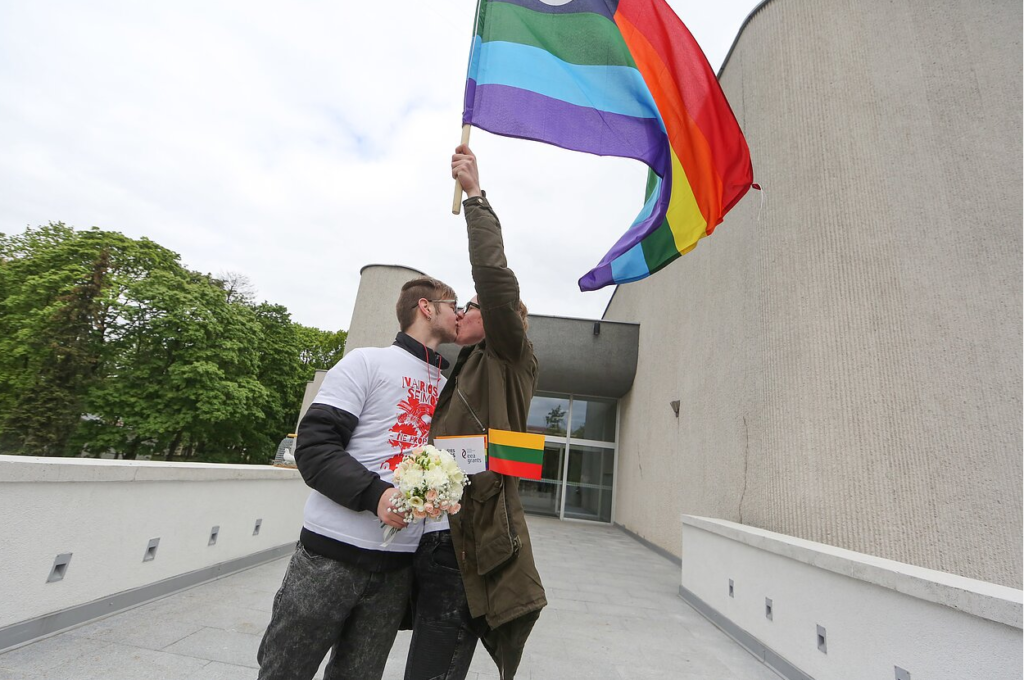
Their garden became a no-go area. They had never retaliated but the police were, they said, unwilling to do anything for fear of being accused of racism. The local authority opened an Islamic centre nearby and a senior Islamic cleric gave a speech to the people attending the ceremony. The local authority representatives there were shocked to find out later that the speech urged Antwerp’s Muslims to attack anyone who was gay and to hurl them to death from the newly-built (council-approved) minarets. Love, peace and vertigo.
In my Koran (I have an English translation published by the Oxford University Press but I hope to learn Arabic one of these days) there is an instruction – several, really – NOT to kill people. In Sura V, called ‘The Table’ (they all have names that seem odd to Western ears) early in the Holy Book, the tale is told of the two sons of Adam. “When they offered a sacrifice, and it was accepted of one of them, and not accepted of the other. ‘I will surely slay thee,’ said one. ‘God accepts only of the god-fearing,’ said the other. ‘Yet if thou stretchest out they hand against me, to slay me, I will not stretch out my hand against thee to slay thee; I fear God, the Lord of all Being. I desire that thou shouldest be laden with my sin and thy sin, and so become an inhabitant of the Fire; that is the recompense of the evildoers’.” But nobody was thrown off a minaret to make the point; any punishment was left to God. I do not doubt that today’s senior clerics know their Koran very thoroughly and certainly much better than I do, but from what I have read, most of it is devoted to wise words urging peace and brotherhood. Perhaps Mohammad (peace be upon him) doesn’t actually want his followers to go out and murder people, just for being different.
RUN, RUN, AS FAST AS YOU CAN…
Remember the case of Dutee Chand? A similar problem has been hitting the headlines in the United States, where 17-year-old Alanna Smith wants to run for the Lady Tigers athletic team at Louisiana State University. Now a junior at Danbury High School in Connecticut, she took the New England title in the 400 metres while she was a freshman. But now transgender athletes have been asserting their rights to compete according to whatever gender they personally choose. Supposedly ‘female’ athletes against whom she must compete today took part as boys not very long ago. Her lawyers in a federal lawsuit she is bringing are from a conservative Christian group, but support for her case from the Justice Department was hastily withdrawn once Joe Biden was elected and schools athletics bodies don’t seem to be interested. That appears to be the pattern developing under the new administration. If it persists, however, it could mean the end of women’s athletics: all future events will be won by women who were born men. Alanna’s dreams of representing her birth state during her college years are fading because of circumstances over which she has no control. “I just want fairness to be made in all women’s sports,” she told the Washington Times, “This isn’t fair, and I only have a few seasons.”

The problem when deciding what’s right and what’s wrong is that it is seldom, in reality, a question of ‘yes’ or ‘no’. Alanna’s unfortunate situation arises from the lust for glory of some males who cannot compete successfully in all-male events. But it doesn’t mean that those who self-identify as a gender other than their birth gender are to blame, nor that they should be denied access to sporting competitions. I’m glad the decision isn’t up to me, but simply denying the rights of the LGBTIQ community is not the answer. Now, the Vatican has decided that it cannot bless same-sex unions because, it says, “God cannot bless sin”. Given some of the things to which it has turned a blind eye in the past, some may find that a little rich.
The action of the European Parliament in declaring Europe an “LGBTIQ freedom zone” is purely symbolic, in fact, if well-intentioned. Evelyne Paradis, executive director of ILGA Europe, which campaigns for LGBTIQ rights, welcomed the European Commission’s more strident defence of them. “It is essential to take bold and decisive action at multiple levels,” she said, “so that the human rights of LGBTI people in all their diversity will continue to advance across the region, and the promise of equality will be experienced in their lived realities.” It’s strange: in ancient Rome homosexuality was acceptable and several Roman emperors were gay, like Hadrian, who built the famous wall across Britain. He is still rated as one of Rome’s ‘good’ emperors and was a formidable general. Alexander the Great was gay, too, as was (it seems) Homer’s great hero, Achilles. Try telling him he’s “not a real man” and see what happens.
In Oxford, not far from Balliol College and the Eagle and Child pub, where J.R.R.Tolkein used to drink with C.S.Lewis and the other ‘Inklings’, is the Martyr’s Memorial, where in 1555 the bishops of London and Worcester were burned to death for being Protestants. The Archbishop of Canterbury followed soon afterwards, having been obliged to watch from his cell. The gender problem is rather different, though: the bishops had chosen their faith, members of the LGBTIQ community are stuck with what they’ve been given. It would seem we have learned little in the intervening years, except that as well as “yes” and “no”, there is also “maybe”. And, as Popeye the Sailor Man used to say, “I am what I am”. More spinach, anyone?

